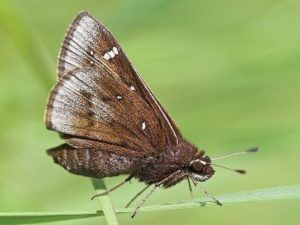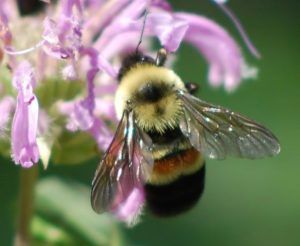Volunteer with On the Ground to Help Restore One of Michigan’s Most Endangered Habitats: The Oak Savanna

Dusted Skipper, photo taken by Steve Walter
Habitat improvement projects are always gratifying work, especially when they benefit rare habitats such as oak savannas. We often hear about how habitat restoration efforts impact charismatic species like white-tailed deer or wild turkeys, but many lesser-known species benefit from these projects just the same.
Rare insects such as the dusted skipper, grizzled skipper, monarch butterfly and numerous bumblebee species depend on habitats like oak savannas to survive. These crucial pollinators influence and benefit from prairie flowers and grasses that grow in oak savannas. Pollinators also act as indicator species, as their presence or absence indicates. Unfortunately, many of these species are threatened by habitat degradation due to fire suppression and encroachment of invasive vegetation.

Rusty Patch Bumblebee, taken by Johanna James-Heinze
You can help restore habitat for Michigan’s insect pollinators as well as other rare species like the eastern box turtle, massasauga rattlesnake, and red-headed woodpecker by volunteering with On the Ground. On Saturday, October 7 from 9am-noon, join On the Ground in partnership with Kent Conservation District in spreading native grass and forb seeds at Cannonsburg State Game Area to increase biodiversity, as well as working to remove invasive vegetation that’s encroaching on this imperiled ecosystem.
For more information, please visit mucc.org/on-the-ground/
Recent Posts



